一般将来时一般现在时现在进行时
初中语法专题讲解--一般现在时现在进行时一般将来时--学生版
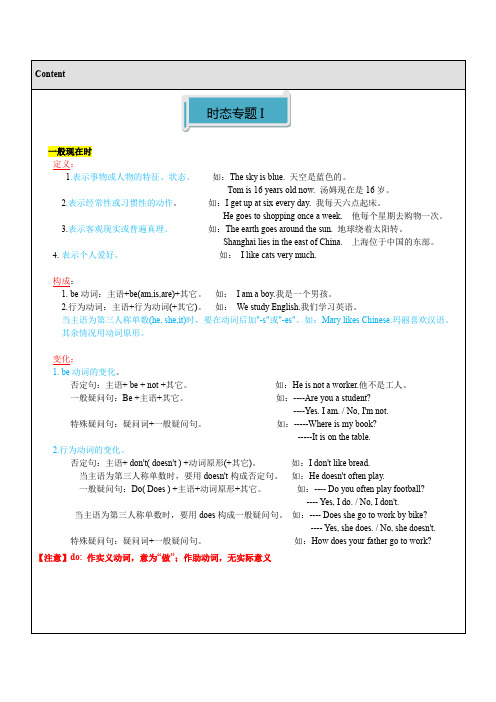
Content时态专题I一般现在时定义:1.表示事物或人物的特征、状态。
如:The sky is blue. 天空是蓝色的。
Tom is 16 years old now. 汤姆现在是16岁。
2.表示经常性或习惯性的动作。
如:I get up at six every day. 我每天六点起床。
He goes to shopping once a week. 他每个星期去购物一次。
3.表示客观现实或普遍真理。
如:The earth goes around the sun. 地球绕着太阳转。
Shanghai lies in the east of China. 上海位于中国的东部。
4.表示个人爱好。
如:I like cats very much.构成:1. be动词:主语+be(am,is,are)+其它。
如:I am a boy.我是一个男孩。
2.行为动词:主语+行为动词(+其它)。
如:We study English.我们学习英语。
当主语为第三人称单数(he, she,it)时,要在动词后加"-s"或"-es"。
如:Mary likes Chinese.玛丽喜欢汉语。
其余情况用动词原形。
变化:1. be动词的变化。
否定句:主语+ be + not +其它。
如:He is not a worker.他不是工人。
一般疑问句:Be +主语+其它。
如:----Are you a student?----Yes. I am. / No, I'm not.特殊疑问句:疑问词+一般疑问句。
如:-----Where is my book?-----It is on the table.2.行为动词的变化。
否定句:主语+ don't( doesn't ) +动词原形(+其它)。
如:I don't like bread.当主语为第三人称单数时,要用doesn't构成否定句。
(完整版)一般现在时、一般过去时、一般将来时、现在进行时

初中语法一般现在时、一般过去时、一般将来时、现在进行时四种时态的区别名称定义时间动词形式时间词always、sometimes、usually、1、动词原形often、every表示经常性或习2、第三人称单一般现在时平时、经常惯性的动作数morning、动词后-s/esevery week、twice a week等等now、rightnow、表示此时此刻或at theam/is/are+动词现在进行时现阶段正在进行正在进行ingmoment、的动作look、listen等in the future、1、will/shall+动next词原形表示将来发生的week/month、一般将来时即将、计划2、am/is/are事tomorrow、+going to+动词in two weeks原形等等ago、yesterday、表示过去某一时1、V-ed(规则last week/候或某一段时间过去(与现动词)一般过去时night、所发生的事情或在无关的)2、不规则动词just now、存在的状态变化once upon atime等注意:1、一般现在时——第三人称单数的动词变化规则:1)大多数动词在词尾加“S”如:stop-______; make-______read-______; play-______2)以辅音字母加“y”结尾的,要先将“y”变为“i”,然后在加“es”如:fly-______;carry-______study-______; worry-______3)以“s, x, ch, sh”结尾的,在词尾加“es”如:teach-______;watch-______4)以“o”结尾的动词,加“es”如:go-______do-______2、现在进行时——动词ing形式的变化规则1.一般动词直接在词尾+ing例:read→______(读)talk→______(交谈)sing→______(唱歌)2.以不发音e结尾的动词,先去e再加ing例:like→______喜欢write→______写skate→______(滑冰)3.以重读闭音节结尾且末尾只有一个辅音字母的动词,双写末尾字母,再加ing例:stop→______(停止)get→______(得到)4.少数几个以ie结尾的动词,变ie为f再加ing。
表示将来的时态(一般现在时表将来,现进表将来以及一般将来时)

我相信,中国将会变成世界上最富有的国家之一。
There is going to be a heavy rain.
将会பைடு நூலகம்一场大雨。
②be going to和will均可表示“意图”:事先考虑过的意图用be going to;不是 事先考虑的意图即临时决定的用will。 I’m going to Qingdao this weekend. 这个周末我要去青岛。 —Sorry,I forgot to buy the book you need. ——对不起,我忘了去买你要的书了。 —It doesn’t matter. I will go myself. ——没关系。我自己去买就行了。
一般现在时
在时间和条件状语从句中可用一般现在时代替
一般将来时。 I’ll let you know as soon as I hear from him. 我一接到他的信就告诉你。
现在进行时
有些动词,如come, go, leave, return, arrive,
begin, start等,它们的现在进行时可表示不远 的将来要发生的事情。例如: Flight 1095 is landing soon. 第1095号航班马上要着陆了。
(
(
)5. Look! Some visitors __ for the bus over there. (2015南宁) A. are waiting B. is waiting C. waiting D. Wait
( (
) 6. ---What were you doing at 5:30 yesterday afternoon? --- I ______ with Sam.(2016 钦州) A. walk B. walks C. was walking D. walked )7. — What are you going to do tomorrow?(2014 柳州) — I ______ visit my aunt. A. went to B .go to C. am going to
一般现在时,现在进行时,一般将来时
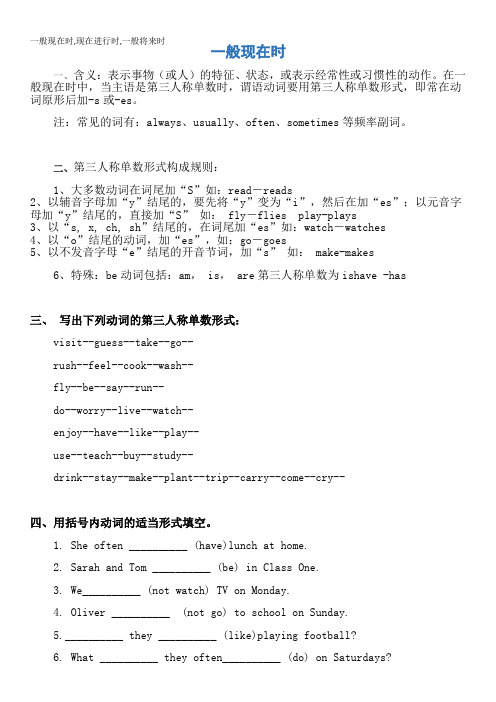
一般现在时,现在进行时,一般将来时一般现在时一、含义:表示事物(或人)的特征、状态,或表示经常性或习惯性的动作。
在一般现在时中,当主语是第三人称单数时,谓语动词要用第三人称单数形式,即常在动词原形后加-s或-es。
注:常见的词有:always、usually、often、sometimes等频率副词。
二、第三人称单数形式构成规则:1、大多数动词在词尾加“S”如:read-reads2、以辅音字母加“y”结尾的,要先将“y”变为“i”,然后在加“es”;以元音字母加“y”结尾的,直接加“S” 如: fly-flies play-plays3、以“s, x, ch, sh”结尾的,在词尾加“es”如:watch-watches4、以“o”结尾的动词,加“es”,如:go-goes5、以不发音字母“e”结尾的开音节词,加“s” 如: make-makes6、特殊:be动词包括:am, is, are第三人称单数为ishave -has三、写出下列动词的第三人称单数形式:visit--guess--take--go--rush--feel--cook--wash--fly--be--say--run--do--worry--live--watch--enjoy--have--like--play--use--teach--buy--study--drink--stay--make--plant--trip--carry--come--cry--四、用括号内动词的适当形式填空。
1. She often __________ (have)lunch at home.2. Sarah and Tom __________ (be) in Class One.3. We__________ (not watch) TV on Monday.4. Oliver __________ (not go) to school on Sunday.5.__________ they __________ (like)playing football?6. What __________ they often__________ (do) on Saturdays?7. __________ your parents __________ (read) newspapers?8. The girl__________ (teach) us English on Sundays.9. She and I __________ (take) a walk together every evening.10. There __________ (be) some water in the bottle.11. Mike__________ (like) cooking.12. He__________ (have) two new books.13. My sister __________ (look) after her baby carefully.14. You always __________ (do) your homework well.15. I__________ (be) ill. I’m staying in bed.16. She __________ (go) to school from Monday to Friday.17. Liu Tao __________ (do) not like PE.18. The child often __________ (watch) TV in the evening.19. -What day __________(be) it today?-It’s Saturday20.-How__________Dad __________(feel)?-He __________(feel) not well.21.-Where__________ he __________(work)?-He __________(work) at sea.现在进行时一、含义:表示正在做某事。
一般现在时-现在进行时-一般将来时

1一般现在时( Present Simple)2。
现在进行时(Present Continuous)3. 将来的安排和打算( Future Arrangements and Intentions)一、一般现在时、现在进行时(一)、辨”个性”一般现在时表示经常性或习惯性的动作,以及主语的特征或状态。
1。
表示主语现在的状态或特征。
例如:I am a teacher.We have a very good relationship with our parents.2。
表示经常性或习惯性动作。
例如:My father goes to work by bike every day。
I always leave home for school at 6:303 。
表示自然现象,普遍真理,客观存在或科学事实。
例如:Shanghai lies in the east of China.The earth moves around the sun.现在进行时表示现在或现阶段正在进行的动作。
例如:1。
表示现在(指说话人说话时)正在发生的事情We are waiting for you at the moment。
2. 表示现阶段正在进行或发生的动作President Xi is visiting in the USA these days。
(二)、辨结构一般现在时的结构是:主 + 动词原形或动词的第三人称单数形式 +...。
.。
现在进行时的结构是: 主 + be(are/ is/am),动词的—ing形式+.。
...。
(三)、辨”信息词"一般现在时常和以下这些时间状语连用:always, often, usually=normally, sometimes=at times, regularly, seldom, never, hardly ever, from time to time, once a month, every day, on Sundays。
一般现在时、一般过去时、一般将来时、现在进行时句子结构

题目一般过去时,现在进行时,一般将来时,一般现在时的句子结构答案解析一、一般现在时结构:主语+ 谓语动词(实义动词或者是be动词)+ 宾语当主语是第三人称单数的时候,后面的谓语动词一定要变成动词的第三人称单数形式. 例:He has an English book.句子中的have 是动词原形,has则是have的第三人称单数形式二、现在进行时结构:be + v+ing + sthbe动词包括(am is are) 什么情况用哪个be动词是由主语决定的!当主语是第一人称“I ”的时候be 动词一定只可以用am当主语是单三的时候,be 动词要用is当主语是第二人称you 或者是其他的时候,be动词一定要用arev+ing 表示的是现在分词,也就是动词的ing 形式现在分词的变化形式:1.动词是以字母“e ”结尾的要去掉e 再+ ing2.直接在动词词尾+ing3.词尾是以一个元音字母加上一个辅音字母,且重读闭音节结尾的要双写辅音字母再+ing 例:play- playing take - takingdo - doing leave - leavingput - putting cut - cutting例:I am playing football with my classmates.He is watching TV at home.They are having an English class.三、一般将来时1.结构:be + going to +do sth例:I am going to do my homework tomorrow.He is going to babysit his sister.We are going to go shopping this weekend.2.will + v(原形)例:He will come back later.I will visit my grandparents next week.3.be + doing sth现在进行时也可以表示计划、打算要做的事情例:I am leaving for Shanghai next Sunday.四、一般过去时结构:主语+ 动词过去式(be 动词,或者实义动词) + 宾语例:I was a little girl 10 years ago.He went to the Great Wall last month.I visited my cousins last Saturday.。
六上英语一般将来时,现在进行时,一般现在时,情态动词规则
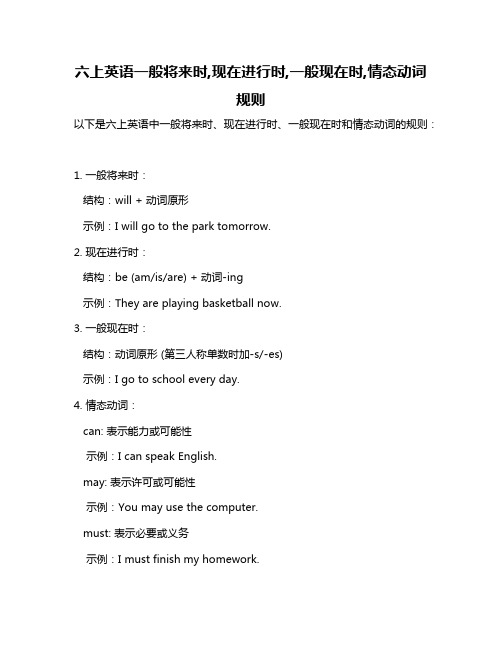
六上英语一般将来时,现在进行时,一般现在时,情态动词
规则
以下是六上英语中一般将来时、现在进行时、一般现在时和情态动词的规则:
1. 一般将来时:
结构:will + 动词原形
示例:I will go to the park tomorrow.
2. 现在进行时:
结构:be (am/is/are) + 动词-ing
示例:They are playing basketball now.
3. 一般现在时:
结构:动词原形 (第三人称单数时加-s/-es)
示例:I go to school every day.
4. 情态动词:
can: 表示能力或可能性
示例:I can speak English.
may: 表示许可或可能性
示例:You may use the computer.
must: 表示必要或义务
示例:I must finish my homework.
shall: 表示建议或命令
示例:You shall stay out of the garden.
will: 表示意愿或将来时间
示例:I will help you.
这些规则是英语语法中的基础部分,需要不断练习和巩固。
如需更多信息,建议查阅语法书籍或咨询英语教师。
一般现在时现在进行时一般将来时一般过去时知识点总结

一般现在时现在进行时一般将来时一般过去时知识点总结一般现在时、一般将来时、一般过去时、现在进行时知识总结一、一般现在时一般现在时表示经常性或惯性的动作,常与表示频度的时间状语连用,如often, usually, always, sometimes, never, seldom, every week/day/year/month...,once a week, on Sundays等。
动词用原形。
当主语为第三人称单数时(he, she, it,一个人名),动词变为三单形式。
Be动词肯定句主语+am/is/are+其它I am a boy.否定句一般疑问句Am/is/are+主语+其它Are you a boy? Yes, I am.No, I am not.Do+主语+动词原形+其它?Do you play basketball after school everyday? Yes, we do. / No, we don't.Does+主语+动词原形+其它。
Does he swim well ? Yes, he does. / No, XXX't.非凡疑问句疑问词(where/what/ when/who/why/how)+am/is/are+主语+别的Where are you?疑问词+do+主语+动词真相+别的?What do you do afterschool everyday?主语+am/is/arenot+别的I am not aXXX.第一人主语+动词原形(+主语+don't+行称I、第其它)。
We play动词原形(+其它)。
wedon’t为二人称basketball afteryou、XXX.playbasketball动复数after schoolXXX.词第三人主语+动词三单主语+称单数式(+别的)。
doesn’t+动词真相(+其XXX.它)。
XXX’tswim well.疑问词+does+主语+动词原形+其它。
简单的时态一般现在时一般过去时将来时和现在进行时
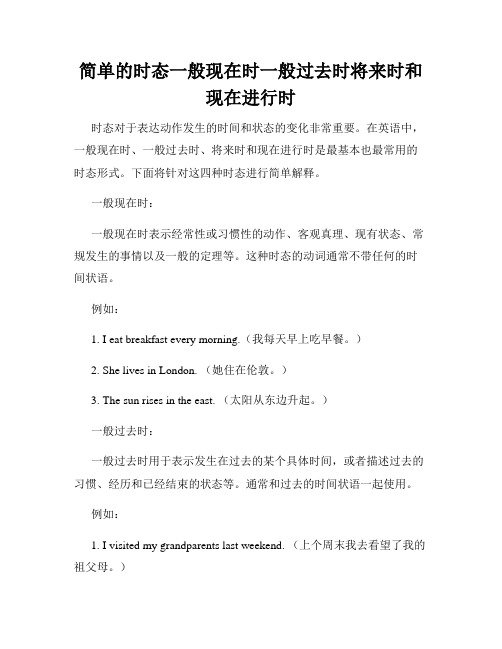
简单的时态一般现在时一般过去时将来时和现在进行时时态对于表达动作发生的时间和状态的变化非常重要。
在英语中,一般现在时、一般过去时、将来时和现在进行时是最基本也最常用的时态形式。
下面将针对这四种时态进行简单解释。
一般现在时:一般现在时表示经常性或习惯性的动作、客观真理、现有状态、常规发生的事情以及一般的定理等。
这种时态的动词通常不带任何的时间状语。
例如:1. I eat breakfast every morning.(我每天早上吃早餐。
)2. She lives in London. (她住在伦敦。
)3. The sun rises in the east. (太阳从东边升起。
)一般过去时:一般过去时用于表示发生在过去的某个具体时间,或者描述过去的习惯、经历和已经结束的状态等。
通常和过去的时间状语一起使用。
例如:1. I visited my grandparents last weekend. (上个周末我去看望了我的祖父母。
)2. They lived in Paris when they were young. (他们年轻的时候住在巴黎。
)3. He worked as a teacher before he retired. (他退休前是一名教师。
)将来时:将来时用于表示将来某个时间将要发生的动作或者存在的状态。
常和表示将来时间的时间状语连用。
例如:1. We will have a meeting tomorrow morning. (明天上午我们将举行一个会议。
)2. She is going to visit her friend next week. (她下周将要去拜访她的朋友。
)3. They are leaving for the airport in an hour. (他们将在一个小时后去机场。
)现在进行时:现在进行时用来表示现在正在进行的动作,或者表示目前的临时状态。
例如:1. I am studying for my math exam. (我正在为我的数学考试学习。
一般现在时,现在进行时,一般将来时的用法
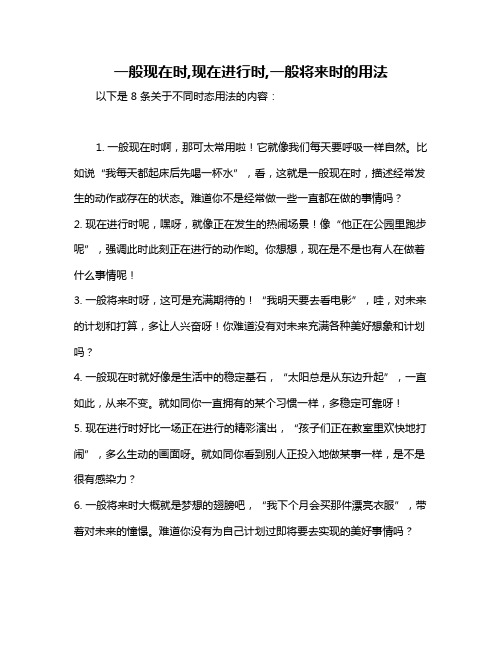
一般现在时,现在进行时,一般将来时的用法以下是 8 条关于不同时态用法的内容:
1. 一般现在时啊,那可太常用啦!它就像我们每天要呼吸一样自然。
比如说“我每天都起床后先喝一杯水”,看,这就是一般现在时,描述经常发生的动作或存在的状态。
难道你不是经常做一些一直都在做的事情吗?
2. 现在进行时呢,嘿呀,就像正在发生的热闹场景!像“他正在公园里跑步呢”,强调此时此刻正在进行的动作哟。
你想想,现在是不是也有人在做着什么事情呢!
3. 一般将来时呀,这可是充满期待的!“我明天要去看电影”,哇,对未来的计划和打算,多让人兴奋呀!你难道没有对未来充满各种美好想象和计划吗?
4. 一般现在时就好像是生活中的稳定基石,“太阳总是从东边升起”,一直如此,从来不变。
就如同你一直拥有的某个习惯一样,多稳定可靠呀!
5. 现在进行时好比一场正在进行的精彩演出,“孩子们正在教室里欢快地打闹”,多么生动的画面呀。
就如同你看到别人正投入地做某事一样,是不是很有感染力?
6. 一般将来时大概就是梦想的翅膀吧,“我下个月会买那件漂亮衣服”,带着对未来的憧憬。
难道你没有为自己计划过即将要去实现的美好事情吗?
7. 一般现在时宛如生活的节拍器,“他总是很乐观”,这就是一贯的状态呀。
就好像身边那个总是乐呵呵的朋友,总是如此呢!
8. 现在进行时如同跳动的火焰,“妈妈正在厨房忙着做饭”,热烈而充满活力。
想想你身边正在忙碌的人,是不是也是这样活力满满呀!
我觉得时态真的是太神奇啦,它们让我们能够准确地表达不同时间的事情和状态呢!。
一般现在时,现在进行时, 一般将来时
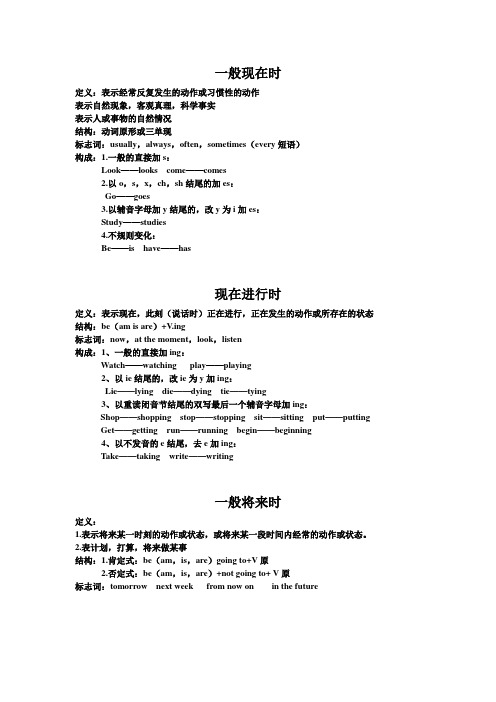
一般现在时定义:表示经常反复发生的动作或习惯性的动作表示自然现象,客观真理,科学事实表示人或事物的自然情况结构:动词原形或三单现标志词:usually,always,often,sometimes(every短语)构成:1.一般的直接加s:Look——looks come——comes2.以o,s,x,ch,sh结尾的加es:Go——goes3.以辅音字母加y结尾的,改y为i加es:Study——studies4.不规则变化:Be——is have——has现在进行时定义:表示现在,此刻(说话时)正在进行,正在发生的动作或所存在的状态结构:be(am is are)+V.ing标志词:now,at the moment,look,listen构成:1、一般的直接加ing:Watch——watching play——playing2、以ie结尾的,改ie为y加ing:Lie——lying die——dying tie——tying3、以重读闭音节结尾的双写最后一个辅音字母加ing:Shop——shopping stop——stopping sit——sitting put——putting Get——getting run——running begin——beginning4、以不发音的e结尾,去e加ing:Take——taking write——writing一般将来时定义:1.表示将来某一时刻的动作或状态,或将来某一段时间内经常的动作或状态。
2.表计划,打算,将来做某事结构:1.肯定式:be(am,is,are)going to+V原2.否定式:be(am,is,are)+not going to+ V原标志词:tomorrow next week from now on in the future。
一般现在时、现在进行时、一般将来时讲解

that you ries因为你所想都是坏的回忆 take your time, you'll find it.别着急,你会找到的
❖4.guess__________ watch__________
❖5.. go__________
do___________
❖6. study__________ fly__________
❖7.cry__________
play__________
❖8. have__________
一般现在时
I see your monsters,我看到你的野兽 I see your pain.你的痛苦
Tell me your problems,向我倾诉你的麻烦 I'll chase them away.我会把它们赶走 I'll be your lighthouse.我会是你的灯塔 I'll make it okay.我会保护你
❖6. study studies fly flies
❖7.cry cries
play plays
❖8. have has
一般现在时
结构2:主语+行为动词+其它 (但是当主语是第三人称单数时,行为动词+s/es/y改i加
es) We go to school at 7:00. Lucy goes to school at 7:00. She stduies English every day. 否定句结构:主语+don’t/doesn’t+动词原形+其它 We don’t go to school at 7:00. Lucy doesn’t go to school at 7:00. She doesn’t stduy English every day.
一般现在时-现在进行时-一般将来时-一般过去时

+be(am/is/ are)+其他否主语+be(am/is/ are)+not+其他+动词原形+其他定主语(非三单)+don’t+动词原形+其他+动词三单形式+其他句主语(三单)+doesn’t+动词原形+其他always、usually、often、sometimes等频率副词;every week(day、year…)、once a week,on Sunday等时间状语;三、第三人称单数形式构成规则:1、大多数动词在词尾加“S”如:read-reads以不发音字母“e”结尾的开音节词,加“s” 如:make-makes2、以“s, x, ch, sh,o”结尾的,在词尾加“es”如:go-goes, guess-guesses, fix-fixes3、以辅音字母加“y”结尾的,要先将“y”变为“i”再加“es”,如:fly-flies, carry-carries, worry-worries,study-studies以元音字母加“y”结尾的,直接加“S”,如:play-plays, stop-stops, say-says4、特殊:○1be动词包括:am,is,are第三人称单数为is ○2have -has四、写出下列动词的第三人称单数形式:visit-- guess-- take-- go--rush-- feel-- cook-- wash--fly-- be-- say-- run--do-- worry-- live-- watch--enjoy-- have-- like-- play--use-- teach-- buy-- study--drink-- stay-- make-- plant--trip-- carry-- come-- cry--五、用括号内动词的适当形式填空。
1. She often __________ (have)lunch at home.2. Sarah and Tom __________ (be) in Class One.3. We__________ (not watch) TV on Monday.4. Oliver __________ (not go) to school on Sunday.5.__________ they __________ (like)playing football?6. What __________ they often__________ (do) on Saturdays?7. __________ your parents __________ (read) newspapers?8. The girl__________ (teach) us English on Sundays.9. She and I __________ (take) a walk together every evening.10. There __________ (be) some water in the bottle.11. Mike__________ (like) cooking.12. He__________ (have) two new books.13. My sister __________ (look) after her baby carefully.14. You always __________ (do) your homework well.15. I__________ (be) ill. I’m staying in bed.16. She __________ (go) to school from Monday to Friday.17. Liu Tao __________ (do) not like PE.18. The child often __________ (watch) TV in the evening.19. -What day __________(be) it today? -It’s Saturday20.-How_________ Dad __________(feel)?-He __________(feel) not well.21.-Where__________ he __________(work)?-He __________(work) at sea.一、含义:表示过去某一时间内发生的动作或存在的状态以及过去习惯性、反复性的动作。
一般现在时现在进行时和一般将来时的总结

3.一般将来时
表示将来要发生的动作存在的状态。 一般由(1)助动词will或shall+动词原形构成。
(2)be going to +动词原形构成。 (3)be about to +动词原形(即将要 发生的将来动作)
He is about to leave when the telephone rings. (4) be to +动词原形(按义务,职责
(2)有些词需要进行时可以表示将来, 如come, go, leave, start, begin, arrive 等,只是表达将来意味,不是时刻 表。
I am coming to see you tomorrow.
His sister is leaving for Hefei
next month.
C. am using
D. would use
4.Don’t believe him. He ____.
A. told lies
B. is always telling lies
C. is about to tell lies D. is going to tell lies
5.A teacher as well as some of his
将要发生的事,命令的语气)
You are to hand in the teacher’s assignment
after class.
Байду номын сангаас
注意:will+V和be going to +V在表示将 来时态可以互换,但是will+V倾向表示 临时决定将要做某事,be going to +V倾 向表示经过考虑,安排将去做某事;还可 以表示将要发生的动作是有迹象表明的。
一般现在时,现在进行时和一般将来时的总结

3.—Can I use your dictionary?
—Sorry, I ___ using
D. would use
4.Don’t believe him. He ____.
A. told lies
B. is always telling lies
C. is about to tell lies D. is going to tell lies
5.A teacher as well as some of his
students____ trees in the garden now.
A. is planting B. are planting
C. plants
D. plant
6.Dr. Smith, together with her wife and
daughters,____ visit Beijing this summer.
A. is going to
B. are going to
实战演练 1. The teacher said that the earth
___round the sun in 365 days. A. move B. moved C. moves D. has
moved
2.I will go and make sure when the next train____.
注意:will+V和be going to +V在表示 将来时态可以互换,但是will+V倾向表 示临时决定将要做某事,be going to +V倾向表示经过考虑,安排将去做某事; 还可以表示将要发生的动作是有迹象表
一般现在时-一般过去时-一般将来时及现在进行时
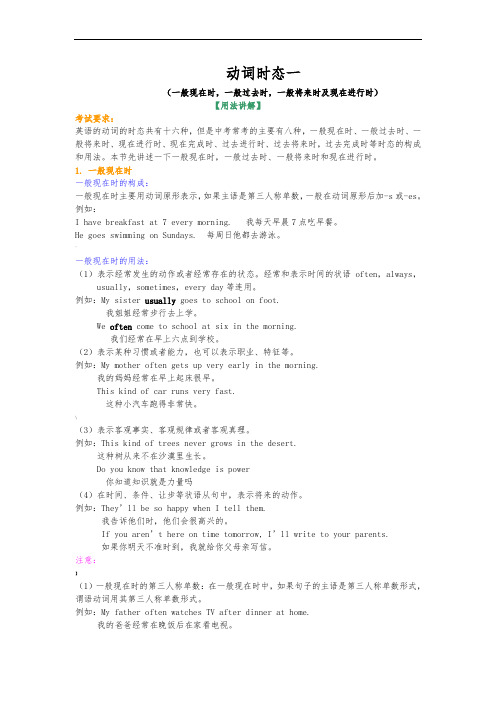
动词时态一(一般现在时,一般过去时,一般将来时及现在进行时)【用法讲解】考试要求:英语的动词的时态共有十六种,但是中考常考的主要有八种,一般现在时、一般过去时、一般将来时、现在进行时、现在完成时、过去进行时、过去将来时,过去完成时等时态的构成和用法。
本节先讲述一下一般现在时,一般过去时、一般将来时和现在进行时。
1. 一般现在时一般现在时的构成:一般现在时主要用动词原形表示,如果主语是第三人称单数,一般在动词原形后加-s或-es。
例如:I have breakfast at 7 every morning. 我每天早晨7点吃早餐。
He goes swimming on Sundays. 每周日他都去游泳。
^一般现在时的用法:(1)表示经常发生的动作或者经常存在的状态。
经常和表示时间的状语often,always,usually,sometimes,every day等连用。
例如:My sister usually goes to school on foot.我姐姐经常步行去上学。
We often come to school at six in the morning.我们经常在早上六点到学校。
(2)表示某种习惯或者能力,也可以表示职业、特征等。
例如:My mother often gets up very early in the morning.我的妈妈经常在早上起床很早。
This kind of car runs very fast.这种小汽车跑得非常快。
\(3)表示客观事实、客观规律或者客观真理。
例如:This kind of trees never grows in the desert.这种树从来不在沙漠里生长。
Do you know that knowledge is power你知道知识就是力量吗(4)在时间、条件、让步等状语从句中,表示将来的动作。
例如:They’ll be so happy when I tell them.我告诉他们时,他们会很高兴的。
思维导图四大时态:一般现在时、现在进行时、一般过去时、一般将来时。
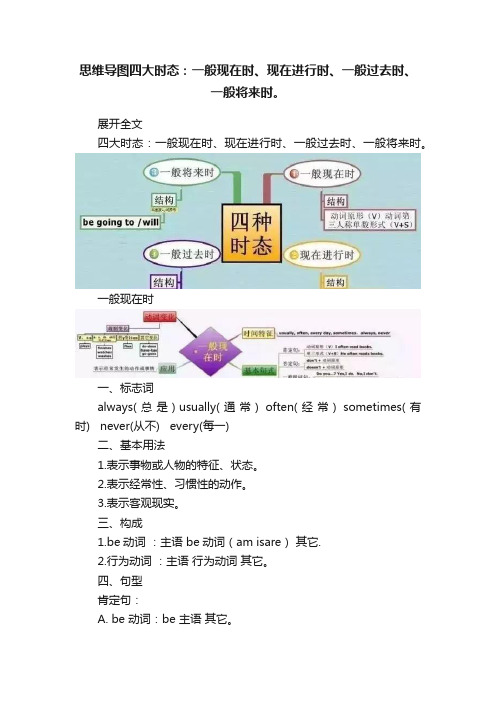
思维导图四大时态:一般现在时、现在进行时、一般过去时、一般将来时。
展开全文四大时态:一般现在时、现在进行时、一般过去时、一般将来时。
一般现在时一、标志词always(总是) usually(通常) often(经常) sometimes(有时) never(从不) every(每一)二、基本用法1.表示事物或人物的特征、状态。
2.表示经常性、习惯性的动作。
3.表示客观现实。
三、构成1.be动词:主语 be动词(am isare)其它.2.行为动词:主语行为动词其它。
四、句型肯定句:A. be 动词:be 主语其它。
B. 行为动词:主语动词(注意人称变化)其它。
否定句:A.be动词:主语 be not 其它。
B.行为动词:主语助动词(do/does) not d动词原形其它一般疑问句:A.be动词:be 主语其它。
B.行为动词:助动词(Do/Does)主语动词原形其他.特殊疑问词:疑问词一般疑问句现在进行时一、标志词tomorrow(明天),soon(不久),will(将要=be going to)二、基本用法表示在在将来某个时间要发生的动作或存在的状态。
三、基本结构1.肯定句:主语 be going to 动词原形。
主语 will 动词原形。
2.否定句:主语 be going to 动词原形。
主语won’t 动词原形3.一般疑问句:Be 主语 going to 动词原形Will 主语动词原形4.特殊疑问句:疑问词一般疑问句一般过去时一、标志词yesterday(昨天),ago(以前),before(在...之前)二、用法1.表示过去某个时间发生的动作或存在的状态,常和表示过去的时间状语连用。
2.表示过去经常或反复发生的动作。
三、基本结构1.be动词(am/is变为was,are变为were)(1)否定句:在was或者were后加not(2)一般疑问句:把was或者were调到句首。
2.行为动词(1)否定句:didn’t 动词原形(2)一般疑问句:在句首 Did,句子中的过去式变为原型。
一般现在时、一般过去时、一般将来时、现在进行时
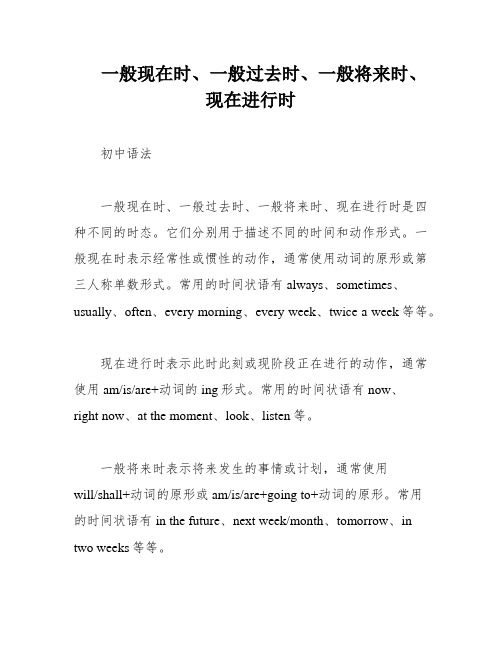
一般现在时、一般过去时、一般将来时、现在进行时初中语法一般现在时、一般过去时、一般将来时、现在进行时是四种不同的时态。
它们分别用于描述不同的时间和动作形式。
一般现在时表示经常性或惯性的动作,通常使用动词的原形或第三人称单数形式。
常用的时间状语有always、sometimes、usually、often、every morning、every week、twice a week等等。
现在进行时表示此时此刻或现阶段正在进行的动作,通常使用am/is/are+动词的ing形式。
常用的时间状语有now、right now、at the moment、look、listen等。
一般将来时表示将来发生的事情或计划,通常使用will/shall+动词的原形或am/is/are+going to+动词的原形。
常用的时间状语有in the future、next week/month、tomorrow、in two weeks等等。
一般过去时表示过去某一时刻或过去某一段时间所发生的动作,与现在无关。
动词的变化规则有以下几种:1)大多数动词在词尾加“S”;2)以辅音字母加“y”结尾的,要先将“y”变为“i”,然后在加“es”;3)以“s。
x。
ch。
sh”结尾的,在词尾加“es”;4)以“o”结尾的动词,加“es”。
现在进行时使用动词的ing形式,变化规则有以下几种:1)一般动词直接在词尾+ing;2)以不发音e结尾的动词,先去e再加ing;3)以重读闭音节结尾且末尾只有一个辅音字母的动词,双写末尾字母,再加ing。
3、一般过去时——动词的变化规则一般过去时是描述过去发生的事情,动词的变化规则如下:1)一般在动词后加-ed。
如:play-played。
offer-offered。
weigh-weighed。
destroy-destroyed。
sign-signed2)在以字母e结尾的动词后,只加-d。
如:like-liked。
英语最基本的五个时态
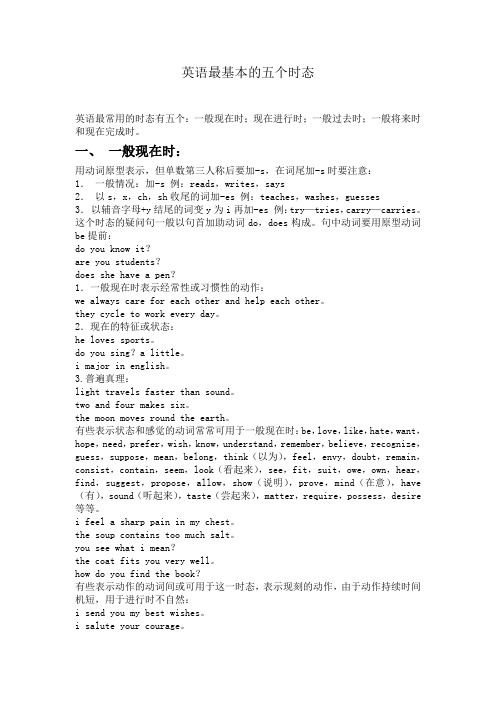
英语最基本的五个时态英语最常用的时态有五个:一般现在时;现在进行时;一般过去时;一般将来时和现在完成时。
一、一般现在时:用动词原型表示,但单数第三人称后要加-s,在词尾加-s时要注意:1.一般情况:加-s 例:reads,writes,says2.以s,x,ch,sh收尾的词加-es 例:teaches,washes,guesses3.以辅音字母+y结尾的词变y为i再加-es 例:try—tries,carry—carries。
这个时态的疑问句一般以句首加助动词do,does构成。
句中动词要用原型动词be提前:do you know it?are you students?does she have a pen?1.一般现在时表示经常性或习惯性的动作:we always care for each other and help each other。
they cycle to work every day。
2.现在的特征或状态:he loves sports。
do you sing?a little。
i major in english。
3.普遍真理:light travels faster than sound。
two and four makes six。
the moon moves round the earth。
有些表示状态和感觉的动词常常可用于一般现在时:be,love,like,hate,want,hope,need,prefer,wish,know,understand,remember,believe,recognize,guess,suppose,mean,belong,think(以为),feel,envy,doubt,remain,consist,contain,seem,look(看起来),see,fit,suit,owe,own,hear,find,suggest,propose,allow,show(说明),prove,mind(在意),have (有),sound(听起来),taste(尝起来),matter,require,possess,desire 等等。
- 1、下载文档前请自行甄别文档内容的完整性,平台不提供额外的编辑、内容补充、找答案等附加服务。
- 2、"仅部分预览"的文档,不可在线预览部分如存在完整性等问题,可反馈申请退款(可完整预览的文档不适用该条件!)。
- 3、如文档侵犯您的权益,请联系客服反馈,我们会尽快为您处理(人工客服工作时间:9:00-18:30)。
七年级下册英语M 3 –M 4 时态复习一般将来时讲解一、概念:表示将要发生的动作或存在的状态及打算、计划或准备做某事。
句中一般有以下时间状语:tomorrow, next day(week, month, year…),soon, the day after tomorrow(后天)等。
二、基本结构:①be going to + do;②will+ do.三、否定句:在be动词(am, is, are)后加not或will后加not成won’t.例如:I’m going to have a picnic this afternoon.→ I’m not going to have a picnic this afternoon.四、一般疑问句:be或will提到句首,some改为any, and改为or,第一二人称互换。
例如:We are going to go on an outing this weekend.→ Are you going to go on an outing this weekend?五、对划线部分提问。
一般情况,一般将来时的对划线部分有三种情况。
1. 问人:Who例如:I’m going to New York soon. →Who’s going to New York soon.2. 问干什么: What … do.例如:My father is going to watch a race with me this afternoon. →What is your father going to do with you this afternoon?3. 问什么时候:When.例如:She’s going to go to bed at nine. →When is she going to bed?六、同义句:be going to = willI am going to go swimming tomorrow(明天). = I will go swimming tomorrow.七、be going to和will 的区别???be going to和will 的用法虽然都表示将来发生动作或情况,但它们的用法是有区别的:1. be going to主要用于:1)、表示事先经过考虑、安排好打算要做的事情。
E.g.What are you going to do today? 今天你们打算做什么?? I’m going to play the violin. 我打算拉小提琴。
2)、表示根据目前某种迹象判断,某事非常有可能发生。
E.g.Look! There come the dark clouds. It is going to rain. 瞧!乌云密集,天要下雨。
I am afraid I am going to have a cold. 恐怕我要患重感冒。
2. will主要用于在以下几个方面:1)、表示单纯的未来“将要”通用各个人称。
eg:They will go to visit the factory tomorrow. 明天他们将去工厂参观。
2)、表示不以人的意志为转移的自然发展的未来的事。
eg:Today is Saturday.?? Tomorrow will be Sunday.今天是星期六。
明天是(将)是星期日。
He will be thirty years old this time next year. 明年这个时候他就(将)三十岁。
3)、问对方是否愿意做某事或表示客气地邀请或命令。
eg:Will you please turn on the radio???? 请打开收音机好吗Will you go to the zoo with me???你和我一起去动物园好吗八. 趋向性动词下列动词: come, go, leave, arrive等词用一般现在时表示将来。
I am coming tomorrow. 我明天过来。
语法练习一.用所给单词的适当形式填空1.There ______(be) an American film next week.2.Tom _______(play) football with us tomorrow.3.Next week we ________(have) an English party.4. She begins________(do) her homework in the afternoon.5.In my dream school there won’t be ________(some) dirty classrooms.6.Tom ________(go) back to Australia in three days.7.The radio says it _______(rain) later on today.8. David ______________ (give) a puppet show next Monday.9. I ________________ (plan) for my study now.10. Today is a sunny day. We __________ (have) a picnic this afternoon.11. My brother _______________ (go) to Shanghai next week.12. Tom often ____________(go) to school on foot. But today is raining.He ______________ (go) to school by bike.13. What do you usually do at weekends?I usually __________ (watch) TV and __________(catch) insects.14. It’s Friday today. What ________she _________ (do) this weekend?She _________ (watch) TV and _________ (catch) insects.15. Mary ____________ (visit) her grandparents tomorrow.二.选择题( ) 1. The train ________ at 11.A. is going to arriveB. will be arriveC. is going toD. is arriving ( ) 2. Charlie ________ here next month.A. isn’t workingB. doesn’t workingC. isn’t going to workingD. won’t work ( ) 3. He ______ very busy this week, he ________ free next week.A. will be; isB. is; isC. will be; will beD. is; will be( ) 4. There ______ a dolphin show in the zoo tomorrow evening.A. wasB. is going to haveC. will haveD. is going to be ( ) 5. –______you ______free tomorrow? – No. I ____free the day after tomorrow.A. Are; going to; willB. Are; going to be; willC. Are; going to; will beD. Are; going to be; will be( ) 6. Mother ________ me a nice present on my next birthday.A. will givesB. will giveC. givesD. give( ) 7. ________ a concert next Saturday?A. There will beB. Will there beC. There can beD. There are( ) 8. He ________ to us as soon as he gets there.A. writesB. has writtenC. will writeD. wrote( )9. – Will his parents go to see the Terra Cotta Warriors tomorrow?– No, _______(不去).A. they willn’t.B. they won’t.C. they aren’t.D. they don’t.( )10.Tomorrow he ___a kite in the open air first, and then ____boating in the park.A. will fly; will goB. will fly; goesC. is going to fly; will goesD. flies; will go ( ) 11. He ________ there at ten tomorrow morning.A. willB. isC. will beD. Be( ) 12. ______your brother ______ a magazine from the library?A. Are; going to borrowB. Is; going to borrowC. Will; borrowsD. Are; going to borrows( )13. -----Will everyone study at home? -----Yes, _______will.A. everyoneB. itC. ID. they( )14. Li Ming is 10 years old now, next year he _____11.A. is?B. is going to be??C. will be??D. will to be( )15. We ________ home next Sunday.A. are going to goB.are goingC. are going toD. are going for◆七年级上英语时态复习一、?一般现在时:(1、现在的状态。
